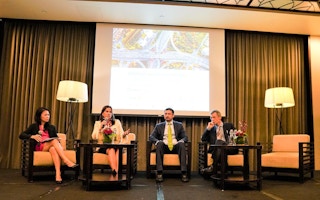Can banks justify financing new coal projects in Southeast Asia because developing countries are still dependent on fossil fuels for energy? This was the question at the centre of debate at a sustainable finance event in the city-state on Friday morning.
The Unlocking Capital for Sustainability forum, organised by Eco-Business, gathered more than 150 business, government and civic society leaders for a conversation on how to get capital markets to fund sustainable projects around the region.
It comes at a time when the financial sector is under the spotlight for financing coal-fired power plants.
Singapore’s largest bank, DBS, released a climate policy—a first for the region— last week that pledged to stop financing new coal-fired power plants, but only in developed countries.
The bank’s position on coal, which is shared by many other Asian banking institutions, is that developing countries still depend on coal to power their economies and meet expanding energy demand in a way that is affordable, and the transition to clean alternatives is not yet feasible.
“
There are 350 coal-fired power plants under construction in Asean. This is almost collective suicide.
Georg Kell, founding director, United Nations Global Compact
Jessica Robinson, the former Asia head of United Nations-backed Principles for Responsible Investment (PRI), told the audience that this argument is “no longer acceptable”.
“The reasoning that the banks use [for funding coal] has come to the point where it is no longer acceptable,” said Robinson, who is founder of female investor platform Moxie Future and also an Eco-Business advisory board member.
The role of Asian banks financing coal projects in Vietnam and Indonesia was highlighted in a recent report from Market Forces that tracked the banks’ lending activity.
It singled out Singapore’s DBS and OCBC, Japanese banks Mizuho, SMBC and MUFG, and Standard Chartered Bank as lending to the Nghi Son 2 project in Vietnam in its report, which was followed by an open letter co-signed by 10 international NGOs and published on Thursday.
They argued that funding coal power plants in Vietnam and Indonesia would risk rendering these countries unable to fulfil the commitments they made as part of the Paris agreement on climate change due to the carbon-intensive nature of coal energy.
Burning coal in these countries would also kill 70,000 people a year pre-maturely from air pollution, according to report by Greenpeace and Harvard University cited in the letter.
Commenting on the state of sustainable finance in Asean earlier in the discussion, Georg Kell, the founding director of the United Nations Global Compact, and now board chairman of Arabesque Partners, said that while it was “encouraging” to hear of progress made, “it’s just not enough—and I think you all know that.”
“There are 350 coal-fired power plants under construction in the Asean region. This is almost collective suicide,” he said. “We have to realise that we still have a very long way to go.”
The renewables era
Kell, who is also on the Eco-Business advisory board, said that while the finance sector is a “laggard” in sustainability, hampered by a traditionally short-term approach to investing, the world is shifting to the “renewable era” where transparency—driven by technology—is the new standard.
“Finance can have a purpose, and be aligned with positive values,” he said.
The financial system needs policymakers, businesses, investors and consumers to work together to “accelerate change,” said Kell.
“We’re still trained in the old industrial era way of thinking where more consumption is better, and throwing away things is a sign of being rich,” he said. “We have to change that mentality.”
Also on the panel was Rahul Sheth, executive director, capital markets, at Standard Chartered Bank. He acknowledged that banks quitting coal is a “movement that’s started—and it’s spreading,” pointing to France, where BNP Paribas and Credit Agricole were among the first to stop financing coal.
“Some economies cannot suddenly stop coal, and move into renewables overnight, as the infrastructure needs development,” Sheth added.
“You need a hybrid model where both (fossil fuel and renewable energy) run in parallel, so you can phase one out. It needs to be done in tandem.”
The speed at which banks transition away from financing fossil fuels to renewable energy depends on how big the renewable industry is, he said.
“
Finance can have a purpose, and be aligned with positive values.
Georg Kell, chairman, Arabesque
Although the outlook for renewable energy adoption in Southeast Asian countries is sunny, the development of the industry has been relatively slow.
This is partly because there have not been enough large-scale renewable energy projects for the banks to support, and because many are deemed “unbankable”, or financially unviable, it was pointed out at the Asian Clean Energy Summit last year.
Governments in Asia need to do more to move the needle on sustainable finance, and support the transition to clean energy, Robinson noted.
“I don’t want people to walk away from this event with the sycophantic impression that we’ve made all this progress, and aren’t we good—because we’re not. Asian governments are not doing enough,” she said.
Governments and regulators need to be doing more to address what Robinson called “a huge systemic risk,” referring to the consequences of the financial system not responding to the threats posed by climate change.
“This is going to blow up. This is a real issue,” she said. “We’ve got to keep the conversation happening. We’ve got to keep pushing people.”
The Unlocking Capital for Sustainability was supported by Standard Chartered Bank and real estate firm City Developments Limited, along with supporting organisations PARIMA, SIIA, Global Compact Network Singapore and RuderFinn.





















